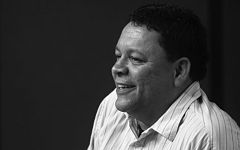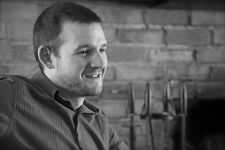His Last Word Was Silence
To S.B
If I’m not dead, if somebody isn’t dreaming or imagining me, then I’m rocking back and forth and it’s cold.
Back and forth. To the rhythm of the thing that for such a long time I’ve called heart. Back and forth. Without effort, to and fro.
The difficult part is departing, leaving the room, walking, step by step, synchronizing feet and cane, crossing the hallways, greeting the nebulous residents of the home, arriving at the huge picture window that faces the garden, imagining that it’s actually a painting, reaching the door, stepping onto the grass, feeling the happiness of the change in surface and arriving at the bench from which I can see the whole garden, and sitting down and starting to rock, back and forth; the only difficult thing is starting.
After a while the body is like a pendulum that swings on its own, tic-toc, back and forth, and you can let it be, and think that the movement will prevent your ancient body from stiffening, that at least this time the joints and bones won’t decide to fuse forever. Tic-toc, back and forth, and then to think that Sam hasn’t come out to the garden this morning, that he shouldn’t be long now.
Tic-toc. While he makes his way I can imagine him like the first time, scared, disconcerted, resigned, looking out on the garden from the door, observing everything with his owl-like eyes and later starting his walk to the bench, nervously supporting his legs on the grass, as though he were afraid he’d break it, long, ungainly, my friend, my companion on many mornings, cold and hot, the solid presence of a very wrinkly face, the stone-like calm that sat next to me on the bench, who rarely talked because, as old friends, we decided from the first look that it wasn’t necessary to talk, that we wouldn’t fill the garden with unnecessary words.
The days we woke up feeling loquacious we would exchange two or three words.
That’s how I learned about the passing of his wife last summer, about his decision to move his octogenarian body to this old folks home, about his now remote distance from the world. I think that was the day that he talked the most, that’s if I didn’t dream his words as he sat beside me, stiff, with that eternal expression like the beginning of a smile.
It took him a long time to confess to me that he had been a writer and it took me even longer to believe him. Him? Sam? Someone that eluded words had writing as a profession? It must be a mistake.
But the next morning he gave me a book. It was a weird book, nothing happened, just a long and monotonous voice that condensed its existence in words.
Then I understood why Sam didn’t talk to me. Everything he had to say to the world was there, on paper, and nothing else was missing.
After that he said very few words. I would await his arrival, his bird-like face peering out at the garden, his careful journey to the bench and his slow and uniform way of sitting down, of finding a position to immobilize himself, with his huge, bony hands over his knees, still, perhaps sad, showing signs of life with a muffled cough that gave away his presence.
I, in the meantime, would rock, back and forth, tic-toc, and I’d open the book and imagine to myself that it was him who was talking, that his voice was pronouncing those long threads of words, monotonous, sad, gloomy, purifying.
When I asked him the name of his last book he responded “Silence.” That was his last word.
I never knew if it was his answer or if he was just asking me to be quiet.
Tic-toc. It looks as if he won’t come. It seems that the rumors about his death are true, the ones I heard or imagined.
It must have been easy for him, he didn’t seem to have an excessive attachment to life.
Back forth.
I’m going to read him anyways, although this garden will miss his presence.
I will miss him too, this rocking hunger for certainty that I am.
That’s if I’m not dead, if somebody isn’t dreaming or imagining me.
![]()
a S.B
Si no estoy muerta, si no es que alguien me sueña o me imagina, me balanceo y hace frío.
Adelante y atrás. Al ritmo de aquello que por mucho tiempo he llamado corazón. Adelante y atrás. Sin esfuerzo, ir y regresar.
La única dificultad es comenzar, salir del cuarto, caminar, paso a paso, sincronizando pies y bastón, cruzar los pasillos, saludar a nebulosos compañeros del hogar, llegar al enorme ventanal que da al jardín, imaginar que es un cuadro, llegar a la puerta, saltar al césped, sentir con alegría el cambio de superficie y llegar al banco desde donde se ve todo el jardín y sentarme y empezar a balancearme, adelante y atrás, la única dificultad es comenzar.
Al poco tiempo el cuerpo es como un péndulo que oscila por su cuenta, tic y tac, adelante y atrás, y puedes desentenderte, pensar que el movimiento impedirá que tu anciano cuerpo se petrifique, que las coyunturas de los huesos por esta vez no podrán tomar la decisión de fundirse para siempre. Tic tac, adelante atrás, y entonces pensar que Sam no ha salido al jardín esta mañana, que no debe tardar.
Tic tac. Mientras llega puedo imaginarlo como la primera vez, asustado, desconcertado, resignado, asomándose al jardín desde la puerta, observándolo todo con sus ojos de lechuza y luego emprendiendo el camino hasta el banco, apoyando con recelo sus piernas en la hierba, como si temiera quebrarla, largo, desgarbado, mi amigo, mi compañero de muchas mañanas de frío o de calor, la sólida presencia de cara muy arrugada, la quietud de roca que cada mañana se sentaba a mi lado en el banco y rara vez hablaba pues, como viejos amigos, decidimos desde la primera mirada que no era necesario hablar, que no llenaríamos el jardín de palabras innecesarias.
Los días que amanecimos locuaces alcanzamos a cruzar dos o tres palabras.
Fue así como supe de la muerte de su esposa en el verano pasado, de su decisión de trasladar su octogenario cuerpo a este hogar de ancianos, de su ya remota lejanía con el mundo. Creo que ése ha sido el día que más habló, si no es que soñé sus palabras mientras permanecía a mi lado, petrificado, con ese eterno gesto parecido a un comienzo de sonrisa.
Tardó mucho en confesarme que había sido escritor y yo tardé aun más para creerle. ¿Él?, ¿Sam?, ¿alguien que eludía las palabras tenía por oficio la escritura? Debía tratarse de un error.
Pero a la siguiente mañana me regaló un libro. Era un libro extraño, no pasaba nada, sólo una larga y monótona voz que cifraba su existencia en las palabras.
Entonces comprendí por qué Sam no me hablaba. Lo que tenía para decirle al mundo estaba ahí, en el papel, y no hacía falta más nada.
Después de eso pronunció pocas palabras. Yo esperaba su llegada, su rostro de pájaro asomándose al jardín, su cuidadosa peripecia hasta el banco y su lenta y uniforme manera de sentarse, de encontrar una posición para inmovilizarse, con sus enormes y huesudas manos sobre las rodillas, quieto, quizás triste, dando señales de vida con una tos apagada que lo traicionaba.
Yo, mientras tanto, me balanceaba, adelante atrás, tic tac, y abría el libro y me imaginaba que era él quien hablaba, que su voz pronunciaba esas largas hileras de palabras, monótonas, tristes, lúgubres, purificadoras.
Cuando le pregunté el nombre de su último libro me respondió: “Silencio.” Ésa fue su última palabra.
Nunca supe si era su respuesta o sólo me pedía que callara.
Tic tac. Parece que no vendrá. Parece que son ciertos los rumores sobre su muerte, que escuché o imaginé.
Debió ser fácil para él, no parecía tener un excesivo apego por la vida.
Adelante atrás.
De todas maneras lo voy a leer. Aunque a este jardín le hará falta su presencia
Y a mí, a este balanceo ávido de certidumbres que soy yo.
Si no es que estoy muerta, si no es que alguien me sueña o me imagina.
Translator’s Note
The inspiration behind the translation of “Su última palabra fue silencio” is certainly multi-faceted and of personal significance. First and foremost, I was attracted to this text by my interest in the teaching and creative work of Colombian writer Gustavo Arango, as well as his role in the modern Latin American narrative. “Su última palabra fue silencio” belongs to a collection of short stories of the same name, originally published in 1993. Arango’s treatment of the themes of silence, solitude and the ambiguity of human existence are recurring themes in this collection of short stories, which represent the early stages of his literary career.
“His Last Word Was Silence,” set within the walls and garden of a nursing home also reflects key elements of my personal experience, as I was raised in a family-run elderly care home with kind, yet sometimes “nebulous” residents. As a child, I frequently gazed upon faces that spoke with expressions of silence which seemed to capture infinite ideas and condense them into seconds, much like the narrative voice of this story.
From a thematic standpoint this story includes the presence of writing and literary creation which can be observed as recurrent themes in Arango’s work. The transcendence of Sam’s existence through the act of writing and being read aloud in the garden inspire us to reflect on the process of writing and its lasting effects on both reader and writer. My personal enjoyment and reflections as a reader have inspired my translation.
With my translation of “Su última palabra fue silencio,” I hope to make Gustavo Arango’s work available to English readers so that they might experience his treatment of the many facets of human existence. I am fortunate to enjoy a close personal relationship with the author, which helps to inform my understanding and appreciation of his work and which also impels me to make it available to the English-speaking public.
In addition to this text, Arango’s novella El país de los árboles locos (The Land of the Crazy Trees) has already been translated and scheduled for release. A complete translation of the anthology His Last Word Was Silence is scheduled for completion by Spring, 2015.
Sean Cook
Binghamton, NY
March 25, 2014
Gustavo Arango is the author of several novels, including El origen del mundo, winner of the Premio Bicentenario de Novela (México, 2010), and La risa del muerto, winner of the Marcio Veloz Maggiolo Prize (New York, 2002), for the best novel in Spanish written in the United States. He has also published three collections of short stories and journalistic works, including Un ramo de nomeolvides, a biographical account of Colombian Nobel Prize winner Gabriel García Márquez, which chronicles the early stages of his writing career. He was the honored author at the 2013 Hispanic/Latino Book Fair of New York. He teaches Spanish and Latin American literature at the State University of New York, Oneonta.
Sean Cook is an instructor and graduate student of Spanish and Latin American literature at Binghamton University in upstate New York. He completed his undergraduate studies in Spanish and Secondary Education at the State University of New York, Oneonta, where his love of literature and literary translation first began. He specializes in translation of contemporary Latin American authors, and also enjoys teaching, traveling, and creative writing.






